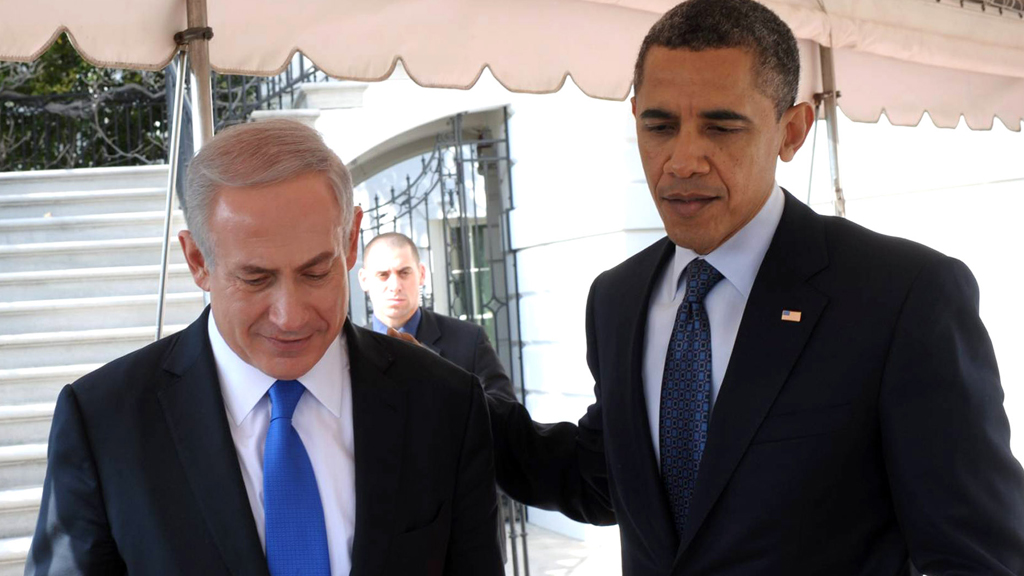Is Obama’s Israel visit symbolism over substance?
Expectations are low ahead of President Obama’s latest visit to Israel after the White House announced it would not be proposing a peace initiative, writes Alon Aviram.

Some political pundits had forecast that the Obama administration would, in its second term, adopt a tougher approach to Israel, assuming that the stranglehold of lobbies on Capitol Hill is less constricting than in the first term of presidency.
But President Obama’s three day visit to Israel this Wednesday is set to be defined by low expectations, with the White House having announced it will not be proposing a peace initiative. Washington is seemingly unwilling to invest further political capital in a peace process until both sides, in particular Israel, are ready.
In a symbolically telling start to the cultural and political tour of Israel and the occupied Palestinian territories, Mr Obama will visit the Iron Dome battery, the missile defence system which the US has helped pay for, reaffirming the close military ties between Israel and the US.
In the context of Israeli claims that Hezbollah is stockpiling missiles from Syria, this event will bolster Israeli President Netanyahu’s efforts to ensure that Iran and Syria are at the top of the agenda during Obama’s stay.
Wednesday evening’s five hours of scheduled talks between the presidents comes at a strategically well-chosen time for Obama. Netanyahu has been weakened by the results of January’s general elections, and Obama is at the height of his power in the second presidency.
Finding common ground
While personal hostility between Obama and Netanyahu marred their relationship in their first terms, neither will be looking to risk further public disputes, instead keeping their differences private.
Noam Sheizaf, editor-in-chief of Israeli-Palestinian magazine 972mag.com, believes Mr Netanyahu will look to reassert himself as leader after the outcome of the Israeli elections, and the US president will try to appease donors and allies back at home, leaving little room for significant political change.
The Israeli right will also be quick to capitalise on Obama’s visit, arguing to the Israeli public that Netanyahu’s confrontational relationship with the US did not overtly damage relations.
As Syria becomes increasingly fragmented in the now two-year-old civil war, Israel will seek approval from the US to launch pre-emptive strikes against Syrian targets should they believe that weapons are being smuggled to Hezbollah in Lebanon, just as they did this January.
On this account, both Obama and Netanyahu will most likely find common ground – neither wants chemical weapons falling into the “wrong hands”.
Getting tough on Tehran?
But Israel will also push the US to take a tougher military position on Tehran, arguing that Iran is intent on developing a nuclear weapons programme, which would pose a threat to Israel and wider western interests in the region. Despite Obama having recently told Israeli reporters that “right now, we think that it would take over a year or so for Iran to actually develop a nuclear weapon”, and Vice-President Joe Biden recently announcing that the “military option remains on the table”, President Obama will most likely be looking to placate these tensions, refusing to commit to any military course of action.
“This is not about accomplishing anything now. This is what I call a down payment trip,” says Aaron David Miller, an adviser on Middle East peace to six secretaries of state and now at the Woodrow Wilson International Centre. Thanks to the new coalition government of centrists, Likud hawks and settlers, not even a settlement freeze can be implemented. As a result, Obama’s visit is guaranteed to be nothing short of symbolic in regards to the Israeli-Palestinian conflict.
Contentious domestic issues will be conveniently overshadowed by larger regional debates, leaving Israeli-Palestinian tensions to simmer and as some fear, increase the likelihood of a third intifada. In the context of a rapidly transforming and unpredictable Middle East, both the US and Israel will be seriously assessing contingency plans in order to maintain their order and geopolitical influence.
Alon Aviram writes for the 972 website




